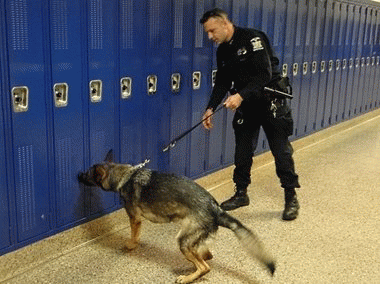In the American police state, you're either a prisoner (shackled, controlled, monitored, ordered about, limited in what you can do and say, your life not your own) or a prison bureaucrat (police officer, judge, jailer, spy, profiteer, etc.).
When you're a child in the American police state, life is that much worse.
Microcosms of the police state, America's public schools contain almost every aspect of the militarized, intolerant, senseless, overcriminalized, legalistic, surveillance-riddled, totalitarian landscape that plagues those of us on the "outside."
From the moment a child enters one of the nation's 98,000 public schools to the moment she graduates, she will be exposed to a steady diet of draconian zero tolerance policies that criminalize childish behavior, overreaching anti-bullying statutes that criminalize speech, school resource officers (police) tasked with disciplining and/or arresting so-called "disorderly" students, standardized testing that emphasizes rote answers over critical thinking, politically correct mindsets that teach young people to censor themselves and those around them, and extensive biometric and surveillance systems that, coupled with the rest, acclimate young people to a world in which they have no freedom of thought, speech or movement.
If your child is fortunate enough to survive his encounter with the public schools, you should count yourself fortunate.
Most students are not so lucky.
By the time the average young person in America finishes their public school education, nearly one out of every three of them will have been arrested.
More than 3 million students are suspended or expelled from schools every year, often for minor misbehavior, such as "disruptive behavior" or "insubordination."
For instance, a Virginia sixth grader, the son of two school teachers and a member of the school's gifted program, was suspended for a year after school officials found a leaf (likely a maple leaf) in his backpack that they suspected was marijuana. Despite the fact that the leaf in question was not marijuana (a fact that officials knew almost immediately), the 11-year-old was still kicked out of school, charged with marijuana possession in juvenile court, enrolled in an alternative school away from his friends, subjected to twice-daily searches for drugs, and forced to be evaluated for substance abuse problems.
Under similarly misguided school zero tolerance policies, students have been suspended for bringing to school household spices such as oregano, breath mints, birth control pills and powdered sugar. Look-alike weapons (toy guns--even Lego-sized ones, hand-drawn pictures of guns, pencils twirled in a "threatening" manner, imaginary bows and arrows, even fingers positioned like guns) can also get a student kicked out.
Acts of kindness, concern or basic manners can also result in suspensions. One 13-year-old was given detention for exposing the school to "liability" by sharing his lunch with a hungry friend. A third grader was suspended for shaving her head in sympathy for a friend who had lost her hair to chemotherapy. And then there was the high school senior who was suspended for saying "bless you" after a fellow classmate sneezed.
Unfortunately, these incidents are indicative of a nationwide phenomenon in which children are treated like suspects and criminals, especially within the public schools.
When you bring the police into the picture, after-school detention and visits to the principal's office are transformed into punishments such as misdemeanor tickets, juvenile court, handcuffs, tasers and even prison terms.
More and more, police are "stepping in to deal with minor rulebreaking--sagging pants, disrespectful comments, brief physical skirmishes. What previously might have resulted in a detention or a visit to the principal's office was replaced with excruciating pain and temporary blindness, often followed by a trip to the courthouse."
Thanks to a combination of media hype, political pandering and financial incentives, the use of armed police officers to patrol school hallways has risen dramatically in the years since the Columbine school shooting.
(Note: You can view every article as one long page if you sign up as an Advocate Member, or higher).






